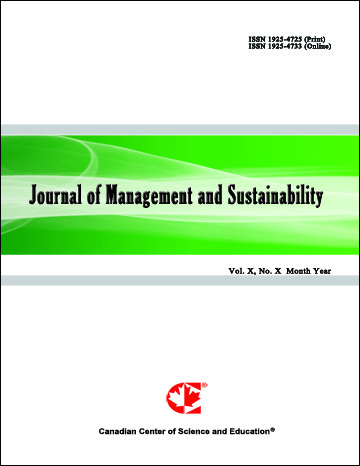Measuring the Conservatism Level in the Accounting Policies and Its Effect on the Financial Information Disclosure Quality in the Jordanian Commercial Banks
- Mohammad Attar
- Abdel Altal
- Haitham Ali
Abstract
The objective of this study is to measure the level of conservatism in accounting policies and its effect on disclosure quality in commercial banks in Jordan. The research was implemented on the Jordanian commercial banks listed at Amman Stock Exchange from the period 2005 to 2014. The study population consists (14) banks used as a sample. The total data observations for the last 10 years were (130), (29) of which were dismissed either because missing observation or outlier, leaving a final study sample of (101) observations. The research used the book value-to-market value ratio and the accruals-to-profit (before extraordinary events and discontinued operations) ratio as proxies for conservatism. While the level of compliance with disclosure instructions was used as a proxy for disclosure quality. The study used two hypotheses to achieve its goals. The results showed that there is a good level of conservatism in accounting policies used by Jordanian commercial banks, which is one of the banking sector characteristics. The study showed a significant effect of accounting conservatism measured by using the accruals-to-profit ratio on the disclosure quality, but not when using the book value-to-market value ratio. This difference in results could be referred to the presence of pure accounting factors in the accruals-to-profit ratio, but there are additional environmental factors in the book value-to-market value ratio.
- Full Text:
 PDF
PDF
- DOI:10.5539/jms.v6n3p91
Journal Metrics
Google-based Impact Factor (2021): 1.54
h-index (July 2022): 37
i10-index (July 2022): 147
h5-index (2017-2021): 12
h5-median (2017-2021): 19
Index
- Academic Journals Database
- ANVUR (Italian National Agency for the Evaluation of Universities and Research Institutes)
- CAB Abstracts
- CNKI Scholar
- EconBiz
- Excellence in Research for Australia (ERA)
- GETIT@YALE (Yale University Library)
- Harvard Library
- HeinOnline
- Infotrieve
- JournalTOCs
- LOCKSS
- MIAR
- PKP Open Archives Harvester
- RePEc
- Scilit
- SHERPA/RoMEO
- Stanford Libraries
- UCR Library
Contact
- Evelyn XiaoEditorial Assistant
- jms@ccsenet.org
